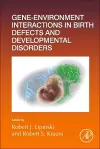
Gene-Environment Interactions in Birth Defects and Developmental Disorders
2 contributors - Hardback
£128.00
Robert J. Lipinski is an Associate Professor and Associate Chair of Comparative Biosciences and Associate Director of the Molecular and Environmental Toxicology program at the University of Wisconsin. He is also an Associate Editor for the American Journal of Medical Genetics and serves on the organizing committee for the David W. Smith Workshop on Malformations and Morphogenesis. His research program is focused on environmentally sensitive developmental mechanisms that regulate craniofacial morphogenesis. His research team has developed in vivo and advanced in vitro models that recapitulate molecular, cellular, and morphological aspects of human embryogenesis to identify genetic and environmental risk factors and investigate their interaction in causing birth defects. Robert S. Krauss is Mount Sinai Chair in Cell Biology; Professor of Cell, Developmental, and Regenerative Biology at the Icahn School of Medicine at Mount Sinai; and a member of The Black Family Stem Cell Institute and Mindich Child Health and Development Institute. His work focuses on the mechanisms of early embryonic development and adult tissue regeneration. His laboratory uses a wide combination of approaches to gain insight into how genes and the environment interact in the causation of common birth defects, and how adult stem cells are called into action to repair injury to tissues. His lab has constructed accurate animal models for holoprosencephaly, a common and often devastating birth defect, leading to identification of genetic and environmental risk factors. In other work, his lab has identified factors critical to regulation of adult stem cells and muscle regeneration.